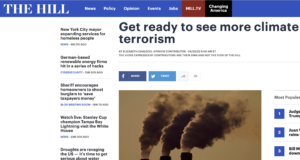https://thehill.com/opinion/energy-environment/3460232-get-ready-to-see-more-climate-terrorism/
BY ELIZABETH CHALECKI – A professor at the University of Nebraska Omaha, a former research fellow at the Woodrow Wilson International Center for Scholars and a research chair with Fulbright Canada.
In early November, two eco-activists were arrested in Newcastle, Australia, for blocking the Port of Newcastle’s outgoing coal-loading operations. The two women abseiled from coal-loading equipment to make a protest statement about their government’s lack of action on climate change. Their frustration was evident: We are trying to survive, they explained, and the government is doing nothing.
The increasing infuriation of climate activists is warranted, in Australia and around the world. The UN’s Intergovernmental Panel on Climate Change (IPCC) produces ever more dire warnings of the effect of a warming climate, but nations have consistently failed to reduce or control greenhouse gas emissions, even as a 2021 Pew poll found that nearly three-quarters of respondents thought climate change would harm them personally. In the United States, two-thirds of Americans say the government should do more to fight climate change, but the government has whipsawed between leaving the Paris Agreement and rejoining. If a Republican is elected in 2024, we could leave again. Meanwhile, atmospheric CO2 has steadily climbed to 419 ppm, the highest concentration ever recorded.
What drives environmental activists to blockade railroads? Recent political science research has indicated that there is little correlation between the preferences of the majority in supposedly democratic societies and actual political outcomes, and that economic and business elites have far more influence than ordinary citizens over government policy. Repeated citizen demands for climate legislation, divestment plans for universities, the fossil fuel nonproliferation treaty, even the IPCC’s own findings — all founder against the bulwark of entrenched economic interests. “Kayaktivism” and other more benign forms of protest make for good television footage, but result in no real change.
In Australia, Deputy Prime Minister Barnaby Joyce dismissed the protesters’ climate concerns, saying “we’ve got to make a buck.”
This is how terrorism begins. Social or political groups who think they have a legitimate grievance may petition for redress from their government, but are ignored, shut out or arrested. If they can’t achieve the desired results by legitimate means, the group will turn to more extreme forms of protest in order to force the government to acknowledge their cause. But unlike demands to avoid mask-wearing or vaccination, failure to address the climate crisis rapidly will result in catastrophic heating of the planet.
Citizen demands for climate action have been met in the United States with division, in Australia with denial, in Russia with derision, as well as in China and India with demand for more coal. To environmentalists, this is no surprise. Climate activist groups such as Extinction Rebellion, Blockade Australia and Deep Green Resistance have long argued that the current capitalist system of resource extraction is so embedded in the global political system that governments cannot and will not act to stem the climate crisis, because every nation prefers every other nation to cut emissions first while they continue to accrue profit. The empty speeches at the recent UN climate summit COP26 in Glasgow have proven them correct.
…
Labelling environmental activists as “terrorists” is a convenient mental shortcut, because law enforcement can brand them as aberrant criminals and arrest them, without considering their motives or addressing their concerns. The “terrorism enhancement,” a legal designation that adds 15 years to the sentence of those convicted of a crime in the U.S., has been applied to environmental activists over and above white supremacists and the anti-abortion movement. To call someone a “terrorist” is to predetermine their guilt under the worst possible assumptions.
But as the world gets hotter, no amount of law enforcement threats will mollify the growing climate rage.
The anger and dissatisfaction resulting from government paralysis in the face of the climate crisis will spur those concerned to take more strategic direct actions. Climate activists will soon conclude that, if they are going to be judged like terrorists, that might be the only way to get anything done.
Elizabeth L. Chalecki is a professor at the University of Nebraska Omaha, a former research fellow at the Woodrow Wilson International Center for Scholars and a research chair with Fulbright Canada.




